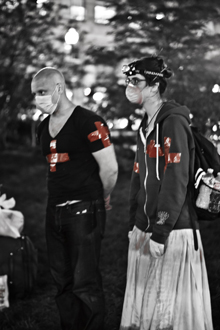Russell Aims, a spokesman for the Massachusetts Board of Registration in Medicine, says practicing first aid in the streets does not require a medical license. "If someone is dehydrated, there's a difference between giving them a bottle of water and hooking them up to a saline IV," says Aims. "Handing out Band-Aids, ACE bandages, cough drops, rinsing eyes, splinting. That all falls within first aid, which falls under Good Samaritan laws."
Hirschman — one of the original medics — says medics know their "scope of practice" well. "The street-medic scope of practice is extremely clear. . . . In 45, almost 50 years, I have never met a street medic who wasn't real clear about what they knew how to do, what they didn't know how to do, and what they could do on the street."
LESSONS LEARNED
Whether or not their actions are legally protected, there are times when the law and the street-medic community have acted together in harmony.
Robert J. McCaughan, chief of the City of Pittsburgh Emergency Medical Services, wrote an article shortly after protests against the G20 meetings in Pittsburgh in 2009 for the Journal of Emergency Medical Services, titled "Pittsburgh Pulls off EMS Coverage during G-20 Summit."
In the article, he notes the city's huge plans and the anticipation that they would need a vastly larger team on duty than usual — but ultimately they were not affected.
"Normal EMS operations weren't affected despite the magnitude of the summit," he wrote. "Positive comments were also received from some protesters and individuals who provided first aid and general care to the protesters, called 'street medics.'" He later went on to write in the "Lessons Learned" section of his report: "Think 'out of the box' by seeking those whose approach to working such events is different than that of the traditional EMS community, i.e., street medics."
Peter Cannon, a street medic from Cambridge, was involved in organizing the street-medic clinic at the Pittsburgh G20.
He explained how the street-medic organizers worked with city officials in their preparations. The summer before the Pittsburgh G20, at the Democratic National Convention in Denver, medics had established positive relationships with the Denver EMS chief. So in 2009, medics in Denver asked that EMS chief to call up Pittsburgh's chief to endorse the street medics. "We ended up having an established system with the Pittsburgh EMS of how to do transfers to hospitals. They printed up these badges because they said they needed something official-looking to be able to recognize us."

"In a way, Occupy was a crash-course in radicalism for different cross-sections of protesters, young and old — even medical professionals." |
DIY HEALTHCAREIt was hard to not recognize street medics at Occupy encampments this fall. Their photographs ran regularly in newspapers nationally; their clearly marked "medic tents" were a cornerstone of conversation about the movement's self-sustaining mini-villages.
Indeed, the Occupy movement brought street medics into an unprecedented spotlight. It was the first time that medics were working simultaneously on the same project in cities across the country, drawing on new interest from medical workers who'd grown disillusioned by the industrialization of the corporate healthcare system.